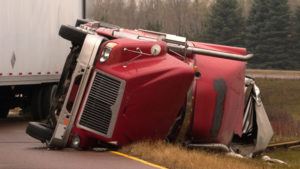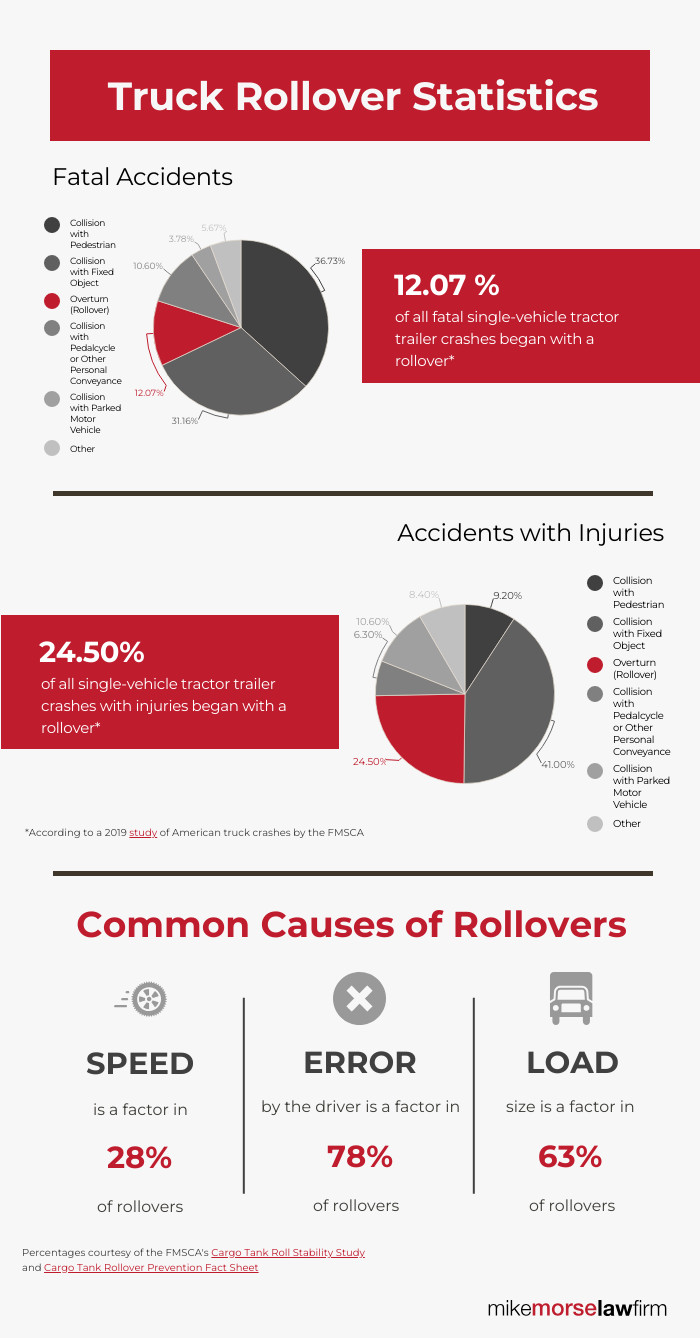Truck Rollover Accident Lawyer

Truck Rollover accidents are extremely dangerous and often preventable. Proper training of drivers, vehicle maintenance, and road awareness can help counteract the inherent danger of driving a commercial truck with a high center of gravity. Preventative measures can help keep truck drivers, other motorists, and cargo safe.
What are truck rollover accidents?
Truck rollover accidents occur when a commercial truck is overturned onto its side or top face. These flips can occur on entrance and exit ramps as well as ordinary, curved stretches of roadway. When a truck changes direction, the load in the trailer does not immediately adjust with it. It continues sliding in the direction the truck had been moving and hits the trailer wall. If the truck is going quickly enough, the force of this impact may tip the vehicle over.
Statistics

For more statistics on truck accidents, check out this article.
Major Causes
The Federal Motor Carrier Safety Administration (FMCSA) has identified four major causes of truck rollover accidents.
-
Vehicle Design and Performance
Commercial trucks have a higher center of gravity than smaller vehicles. This makes them less stable and more likely to lean and tip over when taking a sudden turn. Unfortunately, drivers can’t often control the sharpness of their turns, but taking them slowly can help reduce the extent of the tipping and keep trucks safe.
Vehicle maintenance and manufacturing quality can also factor into a truck’s risk of rolling over. Thorough pre-trip inspections are an important step in ensuring a driver’s safety and should not be skipped or sped through.
-
Load Effects
The contents of a truck’s trailer often shift around during a drive, especially if the truck is transporting a liquid. This moving weight creates forces that can tip over the trailer. Avoiding sudden movements and ensuring that the contents of the trailer are securely fastened can help drivers mitigate their risk of rolling over.
Load size can also affect the risk of a crash. Carrying a partial load allows cargo to shift more violently as the truck drives, as it has more room to move. According to an FMCSA study, 63% of rollovers occur in vehicles carrying partial loads, likely due to this effect.
-
Highway Factors
The physical features and conditions of the road can also put a truck driver at risk of a rollover. Sharp curves can make the load in the trailer shift, steep downhill stretches can dangerously increase speed, and curbs can be tripping hazards. Weather conditions, such as rain and snow, may also soften the road’s shoulders and cause a truck’s wheels to sink or get stuck.
-
Driver Factors
Distractions such as eating, drinking, and adjusting the radio can cause truck drivers to miss important changes to their course or actions made by other drivers. Daydreaming and engaging in distracting behaviors put drivers and their cargo at risk of accidents like rollovers.
Exhaustion is incredibly dangerous for drivers as well. Getting adequate rest before sitting behind the wheel is essential and caffeine is not a replacement for a good night’s sleep.
Driving under the influence of alcohol or other drugs is illegal and may put drivers at a higher risk of rolling over. Certain medications, both over-the-counter and prescription, can also impair a person’s driving. Referring to the precautions on the label and advice of a doctor can be lifesaving.
Prevention
In order to best protect themselves from rollover accidents, truck drivers should:
-
Remember to always do a comprehensive inspection of their truck before taking it on the road
-
Avoid sudden movements while driving
-
Be mindful of load sizes
-
Adjust their speed around turns
-
Identify high-risk areas on the road
-
Remain alert and aware
-
Get adequate rest
-
Conform to speed limits
-
Keep road design and conditions in mind
Transportation companies can help support their drivers by:
-
Requiring truck drivers to engage in ongoing rollover training throughout their careers, including rollover simulations
-
Encouraging drivers to take breaks when they need them and rest as much as they can in their free time
-
Providing proper resources for truck maintenance
-
Creating a company culture that prioritizes safety
Legislators and Government officials can also help keep drivers safe by:
-
Requiring all people pursuing a Commercial Driver’s License (CDL) to complete rollover prevention training before being licensed.
Were you involved in a Michigan Truck Rollover Accident? We can help!
Truck accidents are even more dangerous, harmful, and complicated than accidents involving smaller vehicles. At the Mike Morse Law Firm, we understand the complexities of Michigan law and can help you get the compensation you deserve. You can reach our expert team 24/7 at 855-MIKE-WINS (855-645-3946) or through our website for a free consultation.

Client Success stories
“This firm’s professionalism far exceeds the normal verbal and written communications expected from a law office. They could not have done a better job with the matters concerning my case and I would highly recommend them.”
– Melvin Johnson Highland Park, Michigan
Our clients Say it the best
★★★★★
Melvin Johnson“This firm’s professionalism far exceeds the normal verbal and written communications expected from a law office. They could not have done a better job with the matters concerning my case and I would highly recommend them.”
★★★★★
Hattie Spencer“When the attorneys at the Mike Morse Law Firm represented me, we were not just a number, we were family. They really cared about what I was going through. I could not have asked for better people to work on my case.”
★★★★★
Terrence Williams“I think very highly of Mr. Morse’s office and would recommend them to anyone. It starts with the great feeling you get when you come to the office for the very first time and it has continued with the excellent customer service they always provided. I don’t even need to ask questions because the attorneys and paralegals are so on top of their jobs. They have always been there for me. I have a warm and friendly feeling anytime I stop in. It feels like home.”








